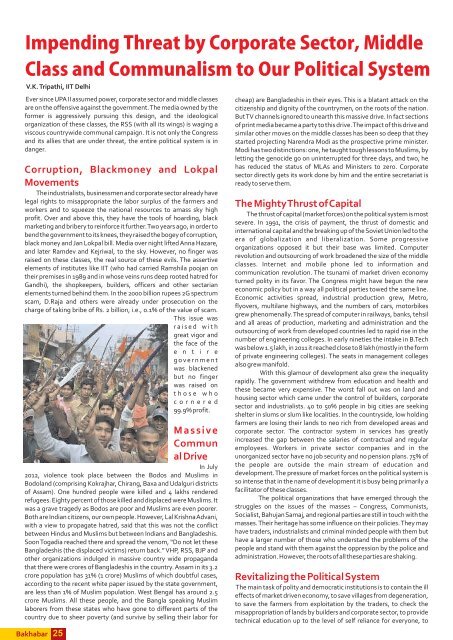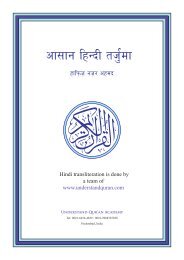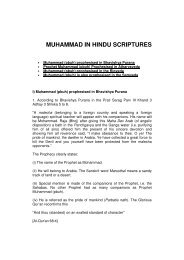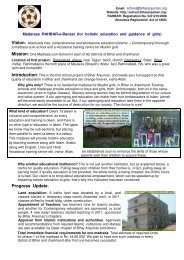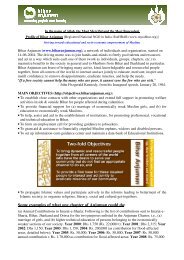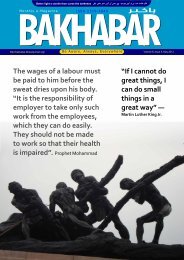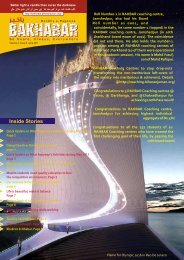Wastage of Food. We willbe made AccountableM. A. HaqueSometime back a BA Member had circulated a video clip which relatedto some Gulf country, obviously a Muslim nation. The rulers of the Stateand few more people were in the desert to have a party. If I remembercorrectly, the total number of persons present there were not morethan fifty. But huge quantity of food was prepared in large sized vesselsby the workers. People consumed only a small portion and the restwere thrown on the desert sand. After meal different types of fruitswere served, again in large quantity. Only part was consumed. The restwas thrown on desert sand. The video depicted that everyone was veryhappy about the whole episode. Probably, they were happy that Allahhas given them enough wealth that they can throw so much food onthe desert sand. In the Arab and other ‘rich’ Muslim countries it is quitecommon to waste food and other materials.the Deputy Minister of Agriculture, Govt. of Afghanistan whom I knewwell and the Head of the “Tableegh” in Afghanistan. I requested themto take up the issue and propagate the concept of conservation amongthe masses, especially the rich section of the country. I am not sure ifthey could do something in that regard.In India too we find that huge quantities of food are wasted, especiallyduring celebrations like marriage, aqeeqa, birthday celebration etc.Even in our daily life we are not careful enough and we allow wastage offood. We need to remember that vary large numbers of people indifferent countries, including our own, remain without adequate foodand nutrition on account of non-availability and poverty. We need toconsider their plight and conserve the food. Our effort should be toI remember one incidence from Iraq. We were there during 1980s. TheIraq-Iran war was going on. Basrah, the only sea port was notfunctioning. As a result, there used to be shortage of different items,including food materials on regular basis. Articles were imported by theGovt. through Jordan, Turkey and Kuwait etc. Occasionally, people hadto struggle to purchase their requirements. We were privileged as wewere with the University. We used to get our requirements onpreferential basis. But we were quite pained to see that people in theneighbourhood and also otherwise used to waste food on day to daybasis. They used to cook much more than their requirements. Moreimportant was that every household had refrigerator/s and also deepfreezer. But they never retained the leftover food materials for laterconsumption. They used the refrigerator/s and also deep freezer onlyfor storing meat, poultry, raw vegetables etc. Whatever food was leftafter meals, the same was thrown out day after day. We used to feelbad. Once I told to one of my neighbours about the wastage. I wasshocked when the lady told me that they were not bothered about thewastages. They had enough money to buy anything. More shockingwas her next sentence. She told that we were concerned about thewastage as we were from a poor country i.e. India. She was quitesarcastic. Obviously, I had no option but to keep silent.24pass on what is extra to those who are not privileged like us.We consider ourselves Muslims. There are clear instructions from Allahin this regard.Allah directs that we should not eat up our wealth in vanity i.e. to showour importance or in pride.يَا أَي ُّهَا ال َّذِينَ آمَنُوا لَا تَأْكُلُوا أَمْوَالَكُم بَيْنَكُم بِالْبَاطِلِ إِل َّا أَن تَكُونَ تِجَارَةً عَن تَرَاضٍ مِّنكُمْ ۚ وَلَا تَقْتُلُواأَنفُسَكُمْ ۚ إِن َّ الل َّهَ كَانَ بِكُمْ رَحِيمًاO ye who believe! Eat not up your property among yourselves unjustlyAfter few years when Iraq was attacked by USA, the entire country wasexcept it be trade amongst you, by mutual consent. And do not killdevastated. People had to practically beg for a morsel. Even water wasyourselves (nor kill one another). Surely, Allah is Most Merciful to you.not available in most places and people had to consume dirty water.[Qur’an: 4/29]Various reports published from time to time brought out the plight ofAs far as wastage is concerned, it is not at all liked by Allah.Iraqis. Millions of children died on account of malnutrition, infectionsand food shortages. When the reports were shown on TV, we wereO you who believe! Make not unlawful the Tayyibat (all that is good asreminded of our stay there and we used to discuss how they used toregards food, things, deeds, beliefs, persons) which Allah has madewaste food when they were provided enough by Allah. Allah did showlawful to you, and transgress not. Verily, Allah does not like thethem how He could punish them for their various mistakes, includingtransgressors. [Qur’an: 5/87]wastage of the resources provided by Him.About wastage, Allah directs time and again that He does not lovethose who waste any resource. Obviously, that will include food and allDuring 2007-2008 when I was in Afghanistan, I experienced a similarother resources.situation. Afghanistan is undergoing strife for several decades. Thecountry is totally dependent on foreign aid for survival. The populationis sharply divided in two categories. A very small part of the populationis very rich, while the rest (about 99%) is extremely poor. We used to see And it is He Who produces gardens trellised and un-trellised, and datehundredsof women and children begging on the roads and even sift palms, and crops of different shapes and taste (their fruits and seeds)through garbage dumps for some eatables. But the tragedy was that and olives, and pomegranates, similar (in kind) and different (in taste).the rich used to waste food and other resources unconcerned of the Eat of their fruit when they ripen, but pay the due thereof (its Zakat) onoverall shortages. During marriages, celebrations, festivals huge the day of its harvest, and waste not by extravagance. Verily, He likesquantities of food were wasted. People used to prepare much more not those who waste by extravagance. [Qur’an: 6/141]than required. The remaining materials were thrown out. Also, I found Allah is kind enough to permit us that we can eat and drink as per ourthat people had the bad habit of filling their plates to full capacity. In needs. But we have no right to waste. Allah does not like those whomost cases half or even more was put in the waste bins as it was not indulge in wastages.possible to consume all. Once I had occasion to discuss the issue withcontinued on page 29<strong>Bakhabar</strong>يَا أَي ُّهَا ال َّذِينَ آمَنُوا لَا تُحَرِّمُوا طَيِّبَاتِ مَا أَحَل َّ الل َّهُ لَكُمْ وَلَا تَعْتَدُوا ۚ إِن َّ الل َّهَ لَا يُحِب ُّ الْمُعْتَدِينَوَهُوَ ال َّذِي أَنشَأَ جَن َّاتٍ م َّعْرُوشَاتٍ وَغَيْرَ مَعْرُوشَاتٍ وَالن َّخْلَ وَالز َّرْعَ مُخْتَلِفًا أُكُلُهُ وَالز َّيْتُونَوَالر ُّم َّانَ مُتَشَابِهًا وَغَيْرَ مُتَشَابِهٍ ۚ كُلُوا مِن ثَمَرِهِ إِذَا أَثْمَرَ وَآتُوا حَق َّهُ يَوْمَ حَصَادِهِ ۖ وَلَا تُسْرِفُوا ۚ إِن َّهُ لَايُحِب ُّ الْمُسْرِفِينَيَا بَنِي آدَمَ خُذُوا زِينَتَكُمْ عِندَ كُلِّ مَسْجِدٍ وَكُلُوا وَاشْرَبُوا وَلَا تُسْرِفُوا ۚ إِن َّهُ لَا يُحِب ُّ الْمُسْرِفِينَ
Impending Threat by Corporate Sector, MiddleClass and Communalism to Our Political SystemV.K. Tripathi, IIT DelhiEver since UPA II assumed power, corporate sector and middle classesare on the offensive against the government. The media owned by theformer is aggressively pursuing this design, and the ideologicalorganization of these classes, the RSS (with all its wings) is waging aviscous countrywide communal campaign. It is not only the Congressand its allies that are under threat, the entire political system is indanger.Corruption, Blackmoney and LokpalMovementsThe industrialists, businessmen and corporate sector already havelegal rights to misappropriate the labor surplus of the farmers andworkers and to squeeze the national resources to amass sky highprofit. Over and above this, they have the tools of hoarding, blackmarketing and bribery to reinforce it further. Two years ago, in order tobend the government to its knees, they raised the bogey of corruption,black money and Jan Lokpal bill. Media over night lifted Anna Hazare,and later Ramdev and Kejriwal, to the sky. However, no finger wasraised on these classes, the real source of these evils. The assertiveelements of institutes like IIT (who had carried Ramshila poojan ontheir premises in 1989 and in whose veins runs deep rooted hatred forGandhi), the shopkeepers, builders, officers and other sectarianelements turned behind them. In the 2000 billion rupees 2G spectrumscam, D.Raja and others were already under prosecution on thecharge of taking bribe of Rs. 2 billion, i.e., 0.1% of the value of scam.This issue wasr a i s e d w i t hgreat vigor andthe face of thee n t i r eg o v e r n m e n twas blackenedbut no fingerwas raised ont h o s e w h oc o r n e r e d99.9% profit.In July2012, violence took place between the Bodos and Muslims inBodoland (comprising Kokrajhar, Chirang, Baxa and Udalguri districtsof Assam). One hundred people were killed and 4 lakhs renderedrefugees. Eighty percent of those killed and displaced were Muslims. Itwas a grave tragedy as Bodos are poor and Muslims are even poorer.Both are Indian citizens, our own people. However, Lal Krishna Advani,with a view to propagate hatred, said that this was not the conflictbetween Hindus and Muslims but between Indians and Bangladeshis.Soon Togadia reached there and spread the venom, “Do not let theseBangladeshis (the displaced victims) return back.” VHP, RSS, BJP andother organizations indulged in massive country wide propagandathat there were crores of Bangladeshis in the country. Assam in its 3.2crore population has 31% (1 crore) Muslims of which doubtful cases,according to the recent white paper issued by the state government,are less than 1% of Muslim population. West Bengal has around 2.5crore Muslims. All these people, and the Bangla speaking Muslimlaborers from these states who have gone to different parts of thecountry due to sheer poverty (and survive by selling their labor for<strong>Bakhabar</strong>25M a s s i v eCommunal Drivecheap) are Bangladeshis in their eyes. This is a blatant attack on thecitizenship and dignity of the countrymen, on the roots of the nation.But TV channels ignored to unearth this massive drive. In fact sectionsof print media became a party to this drive. The impact of this drive andsimilar other moves on the middle classes has been so deep that theystarted projecting Narendra Modi as the prospective prime minister.Modi has two distinctions: one, he taught tough lessons to Muslims, byletting the genocide go on uninterrupted for three days, and two, hehas reduced the status of MLAs and Ministers to zero. Corporatesector directly gets its work done by him and the entire secretariat isready to serve them.The Mighty Thrust of CapitalThe thrust of capital (market forces) on the political system is mostsevere. In 1991, the crisis of payment, the thrust of domestic andinternational capital and the breaking up of the Soviet Union led to theera of globalization and liberalization. Some progressiveorganizations opposed it but their base was limited. Computerrevolution and outsourcing of work broadened the size of the middleclasses. Internet and mobile phone led to information andcommunication revolution. The tsunami of market driven economyturned polity in its favor. The Congress might have begun the neweconomic policy but in a way all political parties towed the same line.Economic activities spread, industrial production grew, Metro,flyovers, multilane highways, and the numbers of cars, motorbikesgrew phenomenally. The spread of computer in railways, banks, tehsiland all areas of production, marketing and administration and theoutsourcing of work from developed countries led to rapid rise in thenumber of engineering colleges. In early nineties the intake in B.Techwas below 1.5 lakh, in 2011 it reached close to 8 lakh (mostly in the formof private engineering colleges). The seats in management collegesalso grew manifold.With this glamour of development also grew the inequalityrapidly. The government withdrew from education and health andthese became very expensive. The worst fall out was on land andhousing sector which came under the control of builders, corporatesector and industrialists. 40 to 50% people in big cities are seekingshelter in slums or slum like localities. In the countryside, low holdingfarmers are losing their lands to neo rich from developed areas andcorporate sector. The contractor system in services has greatlyincreased the gap between the salaries of contractual and regularemployees. Workers in private sector companies and in theunorganized sector have no job security and no pension plans. 75% ofthe people are outside the main stream of education anddevelopment. The pressure of market forces on the political system isso intense that in the name of development it is busy being primarily afacilitator of these classes.The political organizations that have emerged through thestruggles on the issues of the masses – Congress, Communists,Socialist, Bahujan Samaj, and regional parties are still in touch with themasses. Their heritage has some influence on their policies. They mayhave traders, industrialists and criminal minded people with them buthave a larger number of those who understand the problems of thepeople and stand with them against the oppression by the police andadministration. However, the roots of all these parties are shaking.Revitalizing the Political SystemThe main task of polity and democratic institutions is to contain the illeffects of market driven economy, to save villages from degeneration,to save the farmers from exploitation by the traders, to check themisappropriation of lands by builders and corporate sector, to providetechnical education up to the level of self reliance for everyone, to


